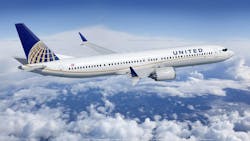United Airlines has cancelled Boeing 737 MAX flights for another month, until December 19, a period that will include the busy Thanksgiving holiday season. The twin-engine, narrow-body jet has been out of service worldwide since late March, following the second of two fatal crashes.
American Airlines cancelled all scheduled 737 MAX flights until December 3, and noted the number of flights per day affected will total about 140.
Southwest Airlines said in August it is cancelling 737 MAX flights until January 2020.
Southwest Airlines is the largest operator of the 737 MAX, with 34 in its fleet, and reportedly has canceled up to 150 flights/day. The Dallas-based carrier was the launch customer for Boeing’s 737 MAX, and is still due to receive 277 more aircraft from its initial order. It’s been estimated that Southwest is cancelling up to 150 flights per day scheduled for 737 MAX jets.
American has 24 of the Boeing narrow-body jets in service, and orders in place for 76 more. United has 14 of the aircraft in service, and orders for 86 more. Reportedly, each of the two carriers has removed about 115 flights/day from their schedules.
A total of 346 passengers and crew members were killed in the two incidents — on Indonesia’s Lion Air in October 2018, and on Ethiopian Airlines in March — which Boeing has indicated were caused by a Maneuvering Characteristics Augmentation System (MCAS), also known as "anti-stall" software, developed to off-set a side-effect of the more fuel-efficient engines adopted for the new version of the 737: because of the engines’ larger size, the planes’ aerodynamic behavior is altered, and the MCAS is meant to counteract a stalling tendency.
Boeing halted deliveries of 737 series jets as it seeks to address the error. The Federal Aviation Administration and other aviation safety agencies around the world must approve the correction and clear the aircraft to return to commercial service.
Boeing has not indicated when the fix may be ready to be installed in the current 737 MAX fleet, which depends on the approval of the FAA and other safety agencies. The FAA said in late August that the team of experts appointed by various aviation safety agencies needs a few more weeks to finish its review of the software fix.
Reportedly, however, Boeing has indicated to 737 program suppliers that it will increase the production rate in October, in order to recover its delivery schedule.
